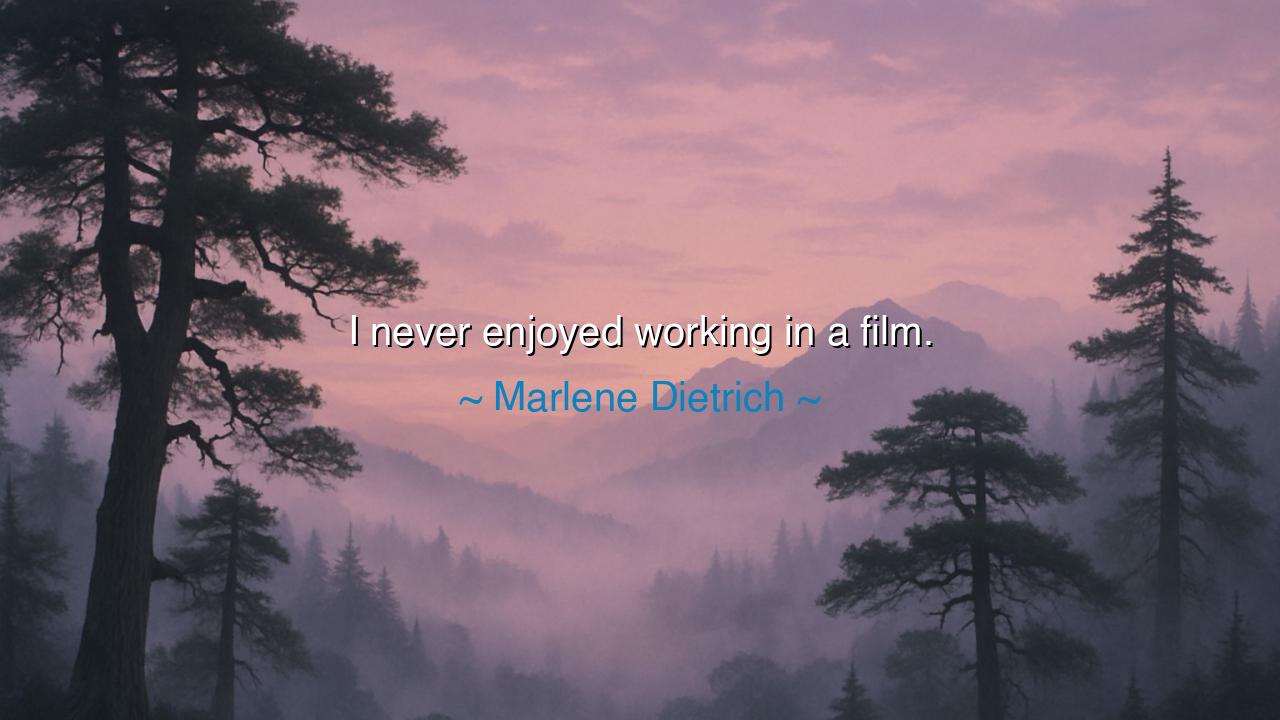
I never enjoyed working in a film.






Hear the stark confession of Marlene Dietrich, the luminous star of the silver screen, who once declared: “I never enjoyed working in a film.” Strange and heavy are these words, for they come not from one cast in shadows but from one who dazzled generations with her presence. They reveal a truth long hidden behind the glitter of stardom—that what appears radiant to the eyes of the world may, in secret, be burdened with toil, sacrifice, and sorrow.
In the golden age of Hollywood, Dietrich shone like a flame in the darkness. Her voice, her gaze, her silhouette became symbols of allure and power. Yet behind the glow of her beauty was the cold machinery of an industry that demanded endless repetition, long hours, and the sculpting of the human being into something almost inhuman. To say she did not enjoy working in film is not to deny her greatness, but to reveal that greatness often blooms from struggle, not delight.
The ancients knew this paradox well. The poet labored through sleepless nights, the sculptor’s hands blistered against unyielding marble, the soldier marched into battles he did not love. Yet from such hardship arose epics, monuments, and legends. So it was with Dietrich: her art endured not because she relished the process, but because she endured the suffering necessary to create beauty. In this, her voice joins the eternal chorus of those who remind us that true creation is born not only of joy, but of discipline and sacrifice.
Consider, O listener, the story of Michelangelo, who painted the Sistine Chapel against his will. Bent backwards upon the scaffolding, his eyes burning with paint, his body aching, he complained bitterly of the labor. And yet, though he did not love the work, he gave the world a vision that would outlast centuries. Like Dietrich, he revealed that the worth of the task is not always mirrored by the pleasure of its doing. The film may not have given her joy, but it gave the world her immortality.
Thus the wisdom emerges: do not mistake the enjoyment of labor for the measure of its worth. Some tasks will weary you, some will break your heart, yet they may also carve your legacy into the stone of time. Pleasure is fleeting, but the fruits of sacrifice endure. Dietrich’s words are not a lament to despair over, but a reminder that glory often demands endurance beyond delight.
And yet, let not these words be misunderstood. To live only in toil without love is to starve the soul. The lesson, then, is balance: accept that the noblest endeavors may often carry hardship, but also seek joy where you can. Honor the weight of sacrifice, but do not forget to nourish yourself with laughter, friendship, and moments of light.
Therefore, O traveler of the present age, when you find yourself weary in your labors, remember Dietrich’s truth. You may not enjoy every step of the path, yet if the work you do carries meaning, if it contributes beauty, strength, or wisdom to the world, then your labor is not in vain. Do not measure only by joy, but by the mark you leave.
So let this be your guiding flame: not all great works are born in happiness, but all great works endure through perseverance. Dietrich never found joy in her films, yet her legacy remains etched into the history of art. Walk likewise, not for pleasure alone, but for the greatness that rises when one endures beyond the self.






AAdministratorAdministrator
Welcome, honored guests. Please leave a comment, we will respond soon